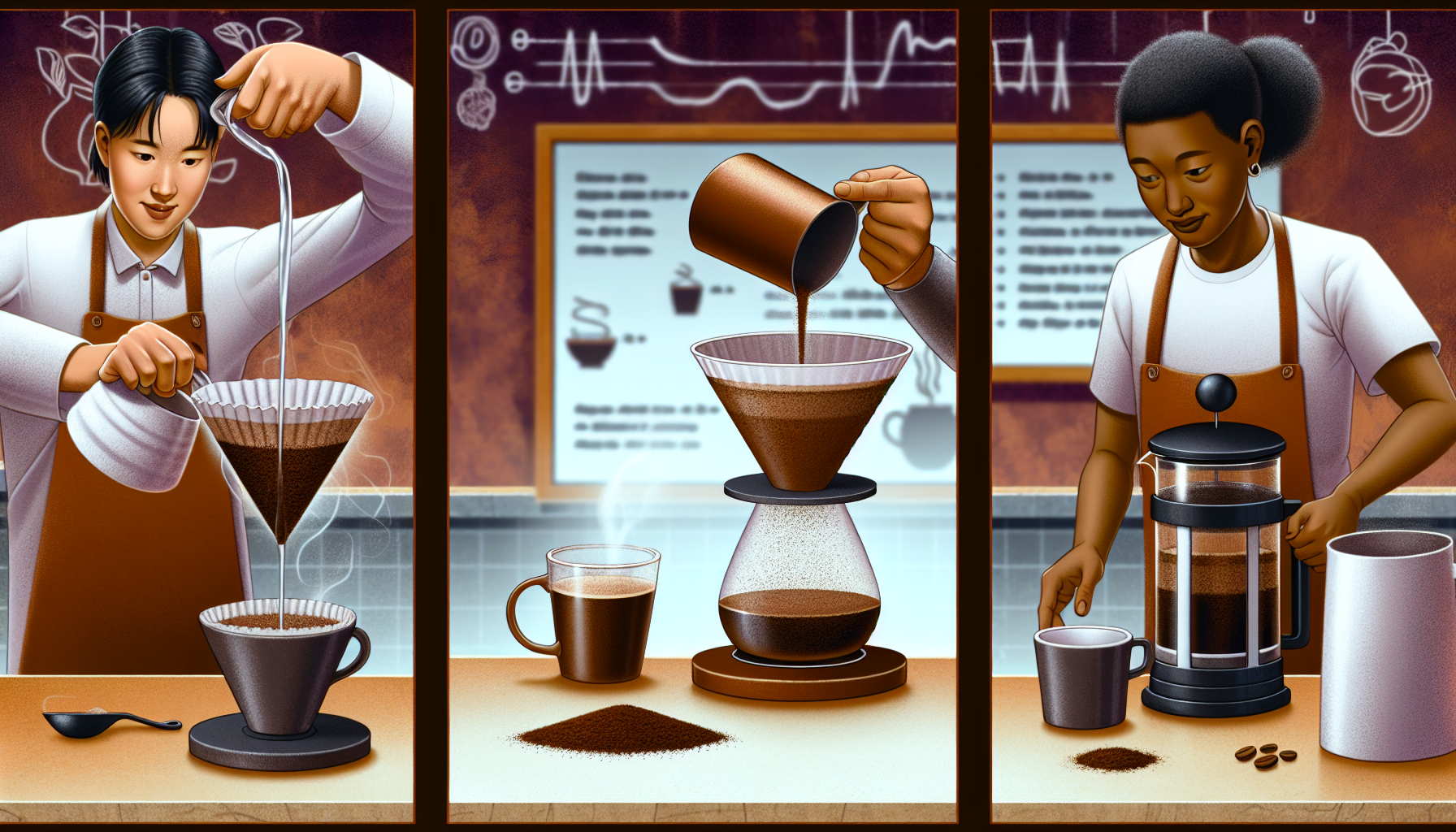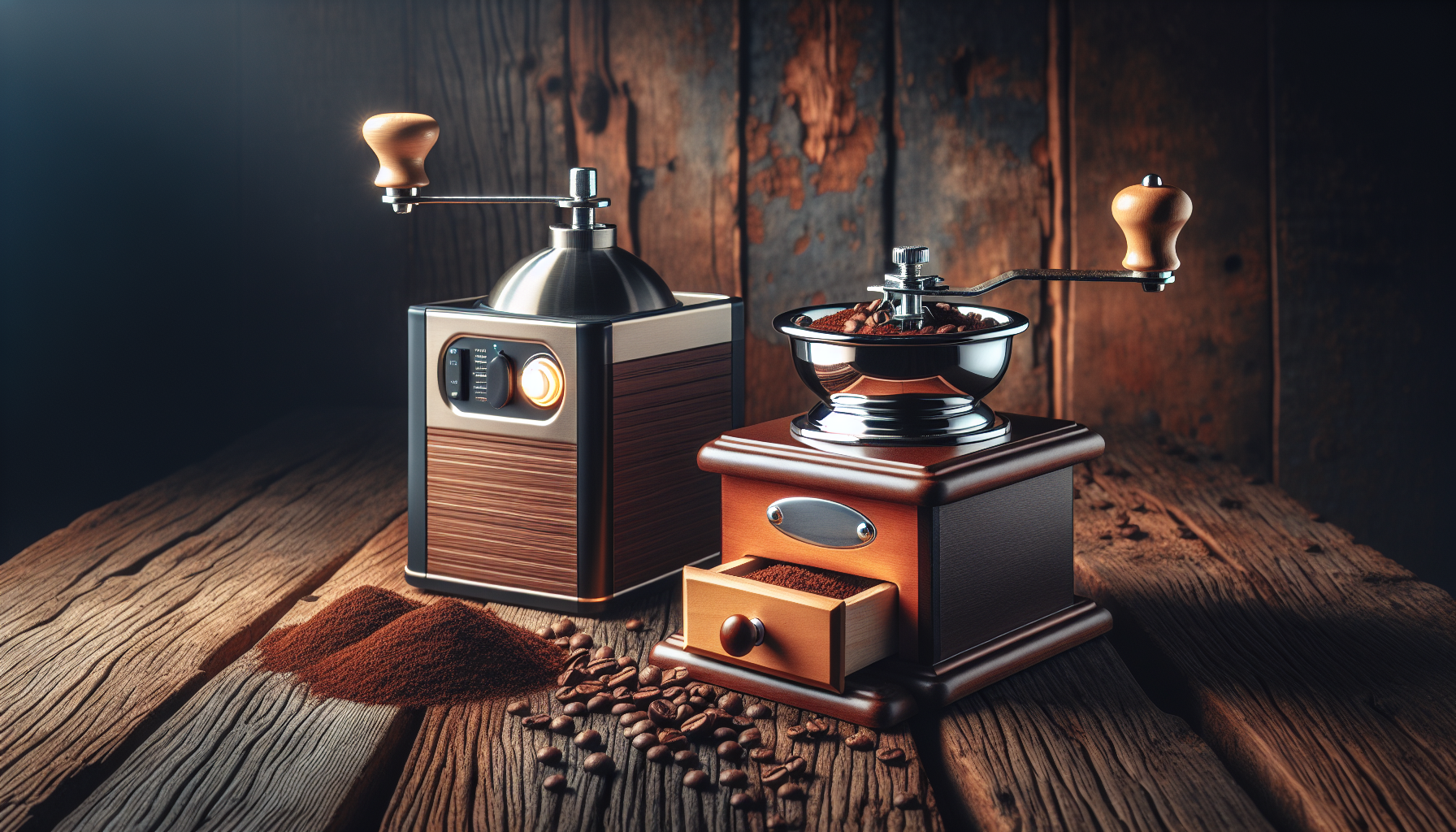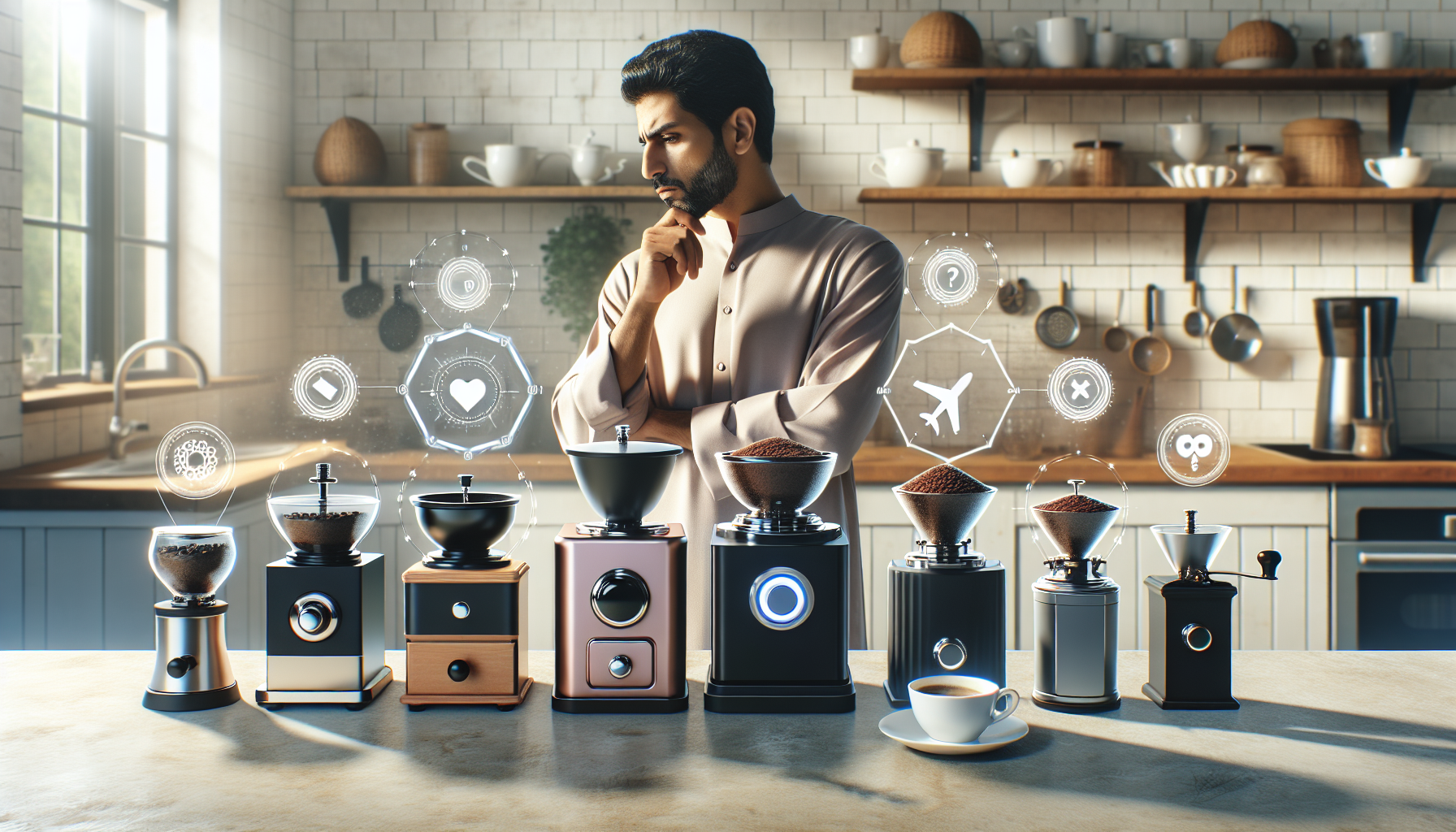When it comes to coffee, every step in the preparation process is crucial—including grinding. If you’re wondering, ‘does the type of coffee grinder make a difference’, the simple answer is yes. The choice between blade or burr, manual or electric impacts the consistency of your grind and, consequently, the flavour of your coffee. In this article, we’ll uncover how different grinders affect your brew and what you should consider when selecting the right grinder for your coffee ritual.
Key Takeaways
- Burr grinders, including conical and flat burr types, are preferred over blade grinders for their ability to produce a consistent and uniform coffee grind, resulting in a balanced and flavourful cup.
- Grind size significantly affects the coffee’s extraction and taste; different brewing methods necessitate different grind sizes, with coarse grinds suited for methods like French press and finer grinds for espresso.
- The choice between electric coffee grinders and manual coffee grinders depends on personal preferences, with electric grinders offering convenience and time-saving features while manual grinders provide a more hands-on, often budget-friendly coffee-making experience.
The Impact of Grinder Types on Coffee Quality

Coffee grinders are not created equal, and the type you choose can significantly affect the quality of your brew. Some coffee lovers swear by the burr grinders’ consistency and precision, while others are content with the more affordable blade grinders. But is there a noticeable difference in the resulting brew?
Undoubtedly, the evidence lies in the cup. The grinder type shapes the coffee grounds’ consistency, influencing the extraction process and, consequently, your coffee’s flavour. We’ll now explore the two prevalent coffee grinders: blade and burr grinders.
Blade Grinders: A Choppy Affair
Blade grinders are often the first port of call for coffee novices, primarily due to their affordability and accessibility. They operate much like a blender, chopping the beans with fast-spinning blades. However, this method often results in:
- inconsistent grounds
- uneven extraction
- over-extraction or under-extraction
- a less flavourful and balanced cup of coffee
These factors can significantly impact the taste of your brew.
The uneven grounds produced by a blade grinder can lead to an uneven flavour profile, mixing the bitterness of finely ground coffee with the robust flavours of coarser particles. However, using certain techniques, like pulsing the grinder, can partially mitigate these inconsistencies.
Burr Grinders: Precision and Uniformity
If consistency and precision are what you’re after, then a flat burr grinder is the way to go. These flat burr grinders use two revolving abrasive surfaces (burrs) to crush the beans, producing uniform grounds. Their design allows for a higher level of consistency in grind sizes, which translates to a more balanced and flavourful cup of coffee.
Burr grinders come in two primary types: conical burr grinders and flat burrs. Each type has its own advantages and is suitable for different brewing methods. Both offer precise and uniform grounds, but they each have their distinct advantages. Regardless of the type, the adjustable nature of burr grinders allows for customisation of the grind size to match different brewing methods, ensuring optimal extraction and flavour profile for each.
The Science of Grinding: Consistency Equals Quality

Grinding coffee transcends merely fragmenting bean coffee into tinier pieces. It demands precision and consistency, with the grind’s consistency drastically influencing your brew’s quality. Uniform grounds ensure that water extracts flavours from all particles at the same rate, resulting in a well-balanced cup of fresh coffee, just like the experience of savouring a traditional Turkish coffee.
Conversely, inconsistent grounds can lead to over-extraction of some beans, resulting in bitterness, and under-extraction of others, causing sourness or a weak flavour profile. By now, you’re probably realising the importance of grind consistency, but what about grind size?
Grind Size Matters
The size of your grind plays a crucial role in determining the flavour of your coffee. Different brewing methods require different grind sizes. For example, a French press requires a coarser grind, while an espresso machine requires a finer grind. The grind size directly affects the extraction process and, consequently, the taste of your coffee.
A coarse grind allows for a longer extraction time, necessary for methods like cold brew, while a fine grind leads to a shorter extraction time, ideal for espresso. A consistent grind size ensures uniform extraction, which is vital for achieving a balanced taste.
Electric vs. Manual: The Convenience Factor

Having understood the significance of grind consistency and size, what about the grinding machine? Do you opt for electric or maintain manual? Your lifestyle, coffee habits, and individual preferences will guide the decision.
Electric grinders are great when you’re brewing for a crowd or when you’re pressed for time. They offer ease and speed, grinding your beans at the push of a button. On the other hand, manual grinders provide a hands-on coffee-making experience, which some coffee purists find more fulfilling and enjoyable.
When to Choose Manual
Manual grinders are compact, quiet, and often budget-friendly. They’re a great choice for travellers or those who enjoy the ritualistic aspect of coffee making. Plus, they’re silent, so you won’t have to worry about waking up the entire household for your early morning brew.
Quality manual grinders offer a consistent grind, rivalling that of their electric counterparts. They might require a bit of elbow grease, but many coffee lovers find the manual grinding process to be a therapeutic and integral part of their coffee routine.
The Case for Electric
If convenience is your top priority, electric burr grinders might be more up your alley. Perfect for larger batches, these grinders, including electric coffee grinders, take the manual labor out of the equation. With the press of a button, your beans are ground to your desired consistency.
In addition to being time-efficient, many electric grinders come with extra features like adjustable grind settings, timers, and dosing controls. However, keep in mind that these features often come with a higher price tag.
Features That Distinguish Great Grinders

Having examined the grinder varieties and their advantages and disadvantages, what attributes should a superior grinder possess? Firstly, a good grinder should provide a consistent and uniform grind. This ensures that all coffee particles extract at the same rate, leading to a balanced and flavourful brew.
Durability is another key factor. A grinder made with high-quality materials and solid construction will last longer and perform better.
Finally, consider the ease of cleaning. A grinder that’s easy to clean will maintain its performance over time and prevent any residue build-up that could affect the taste of your coffee.
Beyond the Grind: Additional Features
While a consistent grind and durability are the hallmarks of a good grinder, there are additional features that can enhance your coffee grinding experience. Some grinders come with adjustable settings, allowing you to fine-tune the coarseness of your grind to match your brewing method.
Other features to look for in a grinder include:
- Timers, which ensure you get the exact grind time every time
- Dosing controls, which allow you to measure the perfect dose for your brew
- Noise-reducing features, perfect for those early morning grinds when the rest of the household is still sleeping.
The Quest for the Perfect Grind: Selecting Your Ideal Grinder

The task of selecting an appropriate grinder might appear overwhelming, but comprehending your coffee habits and preferences can steer you towards the ideal choice. Are you a casual coffee drinker who enjoys a simple cup of joe, or a coffee connoisseur seeking to experiment with different brewing methods?
Budget is another crucial factor to consider. While a more expensive grinder might have more features and a more consistent grind, there are also affordable grinders on the market that do a decent job. It’s all about finding a balance between what you want and what you’re willing to spend.
Understanding Your Coffee Routine
Begin the selection process for your ideal grinder by evaluating your coffee routine. Are you typically brewing a single cup just for you, or do you frequently prepare coffee for several people? Do you prefer a particular brewing method? Understanding these aspects of your coffee routine can help you determine the best grinder for your needs.
For example, if you often make espresso, you might want a grinder with a finer grind setting. If you frequently brew for a crowd, an electric grinder with a larger capacity might be a better fit. Remember, the goal is to enhance your coffee experience, so choose a grinder that aligns with your lifestyle and coffee habits.
The Cost of Quality: Investing in Your Grinder
While procuring a high-quality grinder might appear as an indulgence, it’s an investment yielding long-term benefits. A good grinder can significantly improve your coffee experience, bringing out the best flavours in your beans and allowing you to fully appreciate the nuanced flavours of different coffee varieties.
While it’s possible to find decent grinders at lower price points, a high-quality grinder often comes with a higher price tag. However, considering the impact on the quality of your brew and the potential longevity of a well-made grinder, it a grinder might be worth the investment.
Finding Value in Your Grinder Purchase
When purchasing a grinder, it’s not just about the cost, but also about the value it brings to your coffee routine. A cheap grinder might save you some money upfront, but it might not give you the best results or last very long. On the other hand, a more expensive grinder might provide a more consistent grind, have more features, and last longer.
Finding the best value in a grinder involves considering factors such as durability, grind consistency, and additional features. It’s about finding a balance between quality and cost, and choosing a grinder that fits your budget while still meeting your coffee grinding needs.
Personal Testimonies: Why Coffee Lovers Swear by Their Grinders
Nothing validates the importance of a good grinder more convincingly than the endorsements from coffee enthusiasts themselves. Many coffee enthusiasts recount how a quality grinder has transformed their coffee experience, elevating their daily brews from good to exceptional.
Some coffee lovers swear by their manual grinders, cherishing the hands-on experience and the satisfaction of grinding their own beans. Others revel in the convenience of their electric grinders, appreciating the consistency and ease they bring to the daily grind. Regardless of the type, these personal testimonies highlight the pivotal role a grinder plays in the coffee brewing process.
The Evolution of Coffee Grinders
Coffee grinders have undergone significant transformations since the 15th century when people used manual spice grinders to crush coffee beans. With the advent of the industrial revolution, grinders evolved into more sophisticated machines, capable of producing a more consistent grind.
Today’s coffee grinders are a testament to the evolution of coffee brewing technology. From manual grinders with ceramic burrs to electric grinders with advanced features, the options are endless. This evolution has not only improved the grinding process but has also contributed to elevating the coffee experience for coffee lovers worldwide.
Summary
From the humble blade grinder to the sophisticated electric burr grinder, it’s clear that the type of grinder you choose can significantly impact your coffee experience. Investing in a quality grinder can enhance your brew, bringing out the best flavours and aromas of your coffee beans.
In the quest for the perfect cup of coffee, don’t overlook the importance of a good grinder. By understanding your coffee routine and preferences, you can find a grinder that fits your needs and elevates your daily brew. Whether you’re a casual coffee drinker or a seasoned coffee connoisseur, there’s a grinder out there that can help you achieve your perfect grind.
Frequently Asked Questions
Does type of coffee grinder really matter?
Yes, the type of coffee grinder matters because a reliable burr coffee grinder can provide flavoured, fresh coffee that pre-ground coffee cannot offer.
Does an expensive coffee grinder make a difference?
Investing in an expensive coffee grinder can make a significant difference in the quality of your coffee due to its ability to provide a high-quality, evenly distributed grind. This higher quality comes with a higher price tag.
Do different coffee beans grind differently?
Yes, different coffee beans grind differently due to variations in size, density, and structure, leading to differences in grind speed and particle size. This affects the brewing process and the flavour of the coffee.
What’s the difference between a blade grinder and a burr grinder?
The main difference between a blade grinder and a burr grinder is the way they grind coffee beans. Blade grinders chop the beans, leading to inconsistent grounds, while burr grinders crush the beans between two burrs, resulting in a more consistent and precise grind.
How does grind size affect the taste of coffee?
The grind size affects the extraction process, which ultimately influences the flavour of the coffee. A coarse grind results in a longer extraction time, while a fine grind leads to a shorter extraction time.


